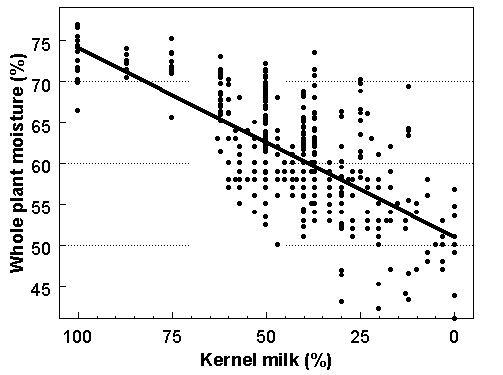Harvesting Silage at the Correct Moisture
September 5, 1996 3(24):142-143
Joe Lauer, Corn Agronomist
A very critical aspect in producing and preserving quality corn silage is harvesting
at the proper whole-plant moisture for the storage structure. Recommended whole-plant
moisture contents for fermenting corn and producing silage vary for different storage
structures (Table 1). In general, more moisture is required to get good packing
in storage structures which allow easy diffusion of air such as bunkers.
|
Table 1. Recommended moisture content (%) for corn stored in various types of storage
structures.
|
|
Upright oxygen limiting silos
|
50-60
|
|
Upright concrete stave silos
|
62-67
|
|
Bag silos
|
60-70
|
|
Horizontal bunker silos
|
65-70
|
|
Roth et al., 1995
|
For many years, corn was harvested for silage at the black layer stage of development.
Lower forage fiber levels, higher digestibility and highest yields were observed
slightly earlier than the black layer stage, and recently this recommendation was
modified to begin corn silage harvesting at 50% kernel milk and be finished by 25%
kernel milk (Wiersma et al., 1993).

Growers often find that corn is too wet and seepage occurs in the silo when corn
is harvested at 50% kernel milk. Figure 1 describes the relationship between whole-plant
moisture and kernel milk for over 400 hybrid * environments between 1991 and 1995.
On average, the recommendation of using kernel milk to predict whole plant moisture
is closely correlated with previous work. For example, at 50% kernel milk whole-pant
moisture equals 63%.
However, the range at 50% kernel milk is 53 to 73% whole plant moisture, with the
majority of the hybrid * environments around 70%. Many hybrids grown in Wisconsin
have a "stay-green" trait which improves standability by keeping the stalk
and leaves green while husk leaves turn brown and open allowing the ear too dry.
The following guidelines should be considered when deciding when to harvest corn
silage:
- Use kernel milk as a guideline for predicting when to begin silage harvest.
- To insure proper fermentation for the storage structure, accurate whole-plant moisture
must be determined.
- The relationship between kernel milk and whole-plant moisture differ among hybrids.
Within a hybrid the relationship between kernel milk and whole-plant moisture is
correlated regardless of environment.
- In general, whole-plant moisture decreases at the rate of 0.5% per day during September.
- If there is more than one type of on-farm storage structure and since most hybrids
tend to be wetter than average around 50% kernel milk due to the stay-green trait,
producers may want to start by filling bunker silos and as the season progresses
move to other structures.
Roth, G., D. Undersander, M. Allen, S. Ford, J. Harrison, C. Hunt, J. Lauer, R.
Muck, and S. Soderlund. 1995. Corn silage production, management, and feeding. American
Society of Agronomy, Madison, WI. 42 pp.
Wiersma, D.W., P.R. Carter, K.A. Albrecht, and J.G. Coors. 1993. Kernel milkline
stage and corn forage yield, quality, and dry matter content. J. Prod. Agric. 6:
94-99.